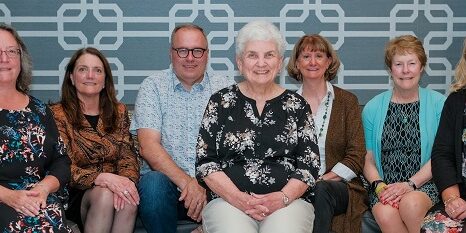Kathy Doig, PhD, MLS(ASCP)CMSHCM
ASCLS and AGT members who played critical roles in negotiating the NCA and BOR merger and who served on the initial Board of Governors of the BOC came together during the 2019 Joint Annual Meeting in Charlotte, North Carolina, in June. Front row from left: Denise Anamani, Kathy Hansen, and Amy Groszbach. Back row from left: Linda Smith, Helen Bixenman, Scott Aikey, Susan Beck, and Kathy Doig.
Ten years ago, this October, the National Credentialing Agency and the American Society for Clinical Pathology Board of Registry (BOR) joined to form the American Society for Clinical Pathology Board of Certification (BOC). The original three sponsors remain the BOC sponsors today—ASCLS, the Association of Genetic Technologists (AGT), and the American Society for Clinical Pathology (ASCP). The 2019 inaugural Joint Annual Meeting of ASCLS and AGT in Charlotte, North Carolina, was the perfect opportunity to bring together individuals who played critical roles in negotiating the merger and serving on the initial Board of Governors of the BOC.
The National Credentialing Agency for Laboratory Personnel (NCA) was formed in the late 1970s by ASCLS—then the American Society for Medical Technology—to offer certification that was not influenced by pathologists. Independent credentialing is a hallmark of an independent profession. The NCA tagline to convey this value was, “Certification for the profession, by the profession.” Sharing this philosophy, AGT joined later to credential cytogenetic and, eventually, molecular scientists. The NCA adopted best practices in certification including the expectation of continuing education to maintain an active credential; a practice that was not expected by the BOR.
Dr. Blair Holliday, current ASCP CEO, then BOR Executive Director, approached the NCA Board of Directors about a merger in the fall of 2005. Thus, began discussions that continued over four years, culminating in the formation of the BOC. The final agreement was signed in fall of 2009 with the NCA dissolving and the BOR morphing into the BOC. A year later, the BOC began certifying individuals as medical laboratory scientists (MLS). MT(ASCP) certificants were offered the opportunity to update to MLS. For a limited time, NCA clinical laboratory scientist (CLS) and molecular biology specialist (CLSp(MB)) certificants were offered the opportunity to transfer their credentials to the BOC as MLS and molecular biology (MB), respectively.
“The formation of the BOC has indeed achieved goals that were inherent from the beginning of the discussions. The smaller influence of pathologists on the BOC, as compared to the BOR, is in keeping with NCA’s original philosophy. In addition, the requirement for credential maintenance (CM) is consistent with NCA’s early expectation of continuing education.”
The formation of the BOC has indeed achieved goals that were inherent from the beginning of the discussions. The smaller influence of pathologists on the BOC, as compared to the BOR, is in keeping with NCA’s original philosophy. In addition, the requirement for credential maintenance (CM) is consistent with NCA’s early expectation of continuing education. Significantly, the main goal, to reduce confusion and complications regarding certification and credentials for students, other potential certificants, and employers, was certainly accomplished with the formation of the BOC.
It is fitting that we mark the 10-year anniversary of the founding of the BOC with appreciation and celebration. Thanks go first to the founders and stewards of NCA from 1978-2009, who carried the torch for “certification for the profession, by the profession.” Their vision led to a better and stronger BOC that is significantly different from the BOR. Thanks go also to the ASCLS and AGT members who have served on the BOC Board of Governors through the first transitional years to make the merger work. This was no easy task to blend two corporate cultures and modes of operation into one. As a result, we can celebrate together as the BOC enters its second decade, dedicated to setting and enforcing quality standards for entry to our laboratory professions and continuing credential maintenance.
Kathy Doig is professor emeritus, Biomedical Laboratory Diagnostics, at Michigan State University in East Lansing, Michigan.

